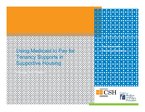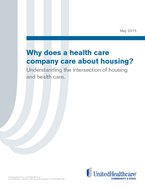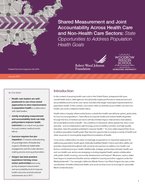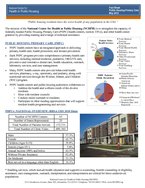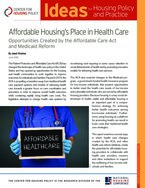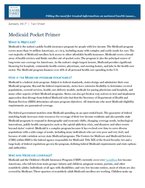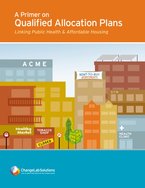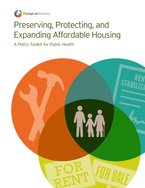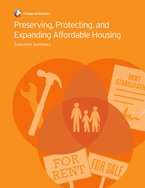0
Policy Brief
Community:
Nov 2, 2018
More than 56 million people live in communities that are classified as high opportunity areas. These neighborhoods often provide access to certain amenities or community attributes that are believed to increase economic mobility for their residents. However, they are also often encumbered by high costs of living and dense populations. As a result, the supply of affordable housing is unable to support the demand. In an effort to combat this, there has been an increased focus from research, policy and affordable housing groups on deconcentrating poverty and promoting affordable housing in high opportunity areas.
Authored by: Freddie Mac Multifamily: Duty to Serve
Topics: Education, Health, Housing, Low-income, Mobility, Safety
 Shared by Mica O'Brien
Shared by Mica O'Brien
Mica O'Brien posted a
on Nov 2, 2018
Freddie Mac Multifamily: Duty to Serve
More than 56 million people live in communities that are classified as high opportunity areas. These neighborhoods often provide access to certain amenities or community attributes that are believed to increase economic mobility for their residents.
0
Policy Brief
Community:
Nov 1, 2018
Colleges and higher education systems can make institutional policy changes to bolster the success of students who are parents and their families through intentional use of a two-generation approach. This brief focuses on traditional two-year and four-year baccalaureate pathways for students who are parents; it complements a brief released on policy solutions.
Authored by: Ascend: The Aspen Institute
Topics: Dual-generation, Education, Low-income, Partnerships, Post-secondary, Youth
 Shared by Mica O'Brien
Shared by Mica O'Brien
Mica O'Brien posted a
on Nov 1, 2018
Ascend: The Aspen Institute
Colleges and higher education systems can make institutional policy changes to bolster the success of students who are parents and their families through intentional use of a two-generation approach.
0
Policy Brief
Community:
Oct 29, 2018
In this Focus on Unaccompanied Youth brief, we review data and information that help us answer the following
questions:
• What is the scale of youth homelessness?
• What do we know about unaccompanied youth who experience homelessness?
• What do we know about patterns of homelessness among unaccompanied youth?
• What do we know about youths’ risks for experiencing homelessness?
• What are the most significant gaps in available data and our current understanding of unaccompanied
youth who experience homelessness?
Authored by: U.S. Interagency Council on Homelessness
Topics: Data sharing, Homelessness, Housing, Low-income, Metrics, Research, Youth
 Shared by Mica O'Brien
Shared by Mica O'Brien
Mica O'Brien posted a
on Nov 1, 2018
U.S. Interagency Council on Homelessness
In this Focus on Unaccompanied Youth brief, we review data and information that help us answer the following
questions:
• What is the scale of youth homelessness?
• What do we know about unaccompanied youth who experience homelessness?
• What do we know about patterns of homelessness among unacc
0
Policy Brief
Community:
Oct 24, 2018
On Wednesday, October 24, President Trump signed into law bipartisan legislation, H.R. 6, the SUPPORT for Patients and Communities Act. This sweeping legislation contains many provisions that could help children, youth, and families experiencing homelessness who are impacted by the opioid crisis, as well as provisions to help all children and youth who experience trauma.
Authored by: SchoolHouse Connection
Topics: Child welfare, Dual-generation, Early childhood, Family engagement, Housing, Legislation & Policy, Low-income, Substance abuse, Supportive housing
 Shared by Mica O'Brien
Shared by Mica O'Brien
Mica O'Brien posted a
on Oct 31, 2018
On Wednesday, October 24, President Trump signed into law bipartisan legislation, H.R. 6, the SUPPORT for Patients and Communities Act.
0
Policy Brief
Community:
Oct 9, 2018
This brief highlights evidence on nutrition supports for families with young children and proposes a policy-focused research agenda designed to address knowledge gaps in two areas: (1) understanding disparities in participation in nutrition supports and (2) assessing strategies to increase access to nutrition supports and reduce nutrition disparities.
Authored by: Mathematica
Topics: Child welfare, Dual-generation, Early childhood, Food insecurity, Low-income, Nutrition, Research
 Shared by Mica O'Brien
Shared by Mica O'Brien
Mica O'Brien posted a
on Oct 22, 2018
This brief highlights evidence on nutrition supports for families with young children and proposes a policy-focused research agenda designed to address knowledge gaps in two areas: (1) understanding disparities in participation in nutrition supports and (2) assessing strategies to increase access to
0
Policy Brief
Community:
Oct 9, 2018
This brief highlights evidence on income support policies, and associated work requirements, for families with young children and proposes a policy-focused research agenda designed to address knowledge gaps in two areas: (1) understanding disparities in participation in income supports and (2) assessing innovative strategies to reduce disparities in income supports.
Authored by: Mathematica
Topics: Legislation & Policy, Low-income, Research, Workforce development
 Shared by Mica O'Brien
Shared by Mica O'Brien
Mica O'Brien posted a
on Oct 22, 2018
This brief highlights evidence on income support policies, and associated work requirements, for families with young children and proposes a policy-focused research agenda designed to address knowledge gaps in two areas: (1) understanding disparities in participation in income supports and (2) asses
0
Policy Brief
Community:
Oct 9, 2018
This brief highlights evidence about early care and education (ECE) access and presents a policy-focused research agenda designed to fill knowledge gaps in three areas: (1) documenting disparities in access to and participation in ECE, (2) identifying and assessing innovations to reduce disparities, and (3) identifying and testing strategies to scale up effective ECE programs.
Authored by: Mathematica
Topics: Early childhood, Education, Legislation & Policy, Low-income, Research, School-readiness
 Shared by Mica O'Brien
Shared by Mica O'Brien
Mica O'Brien posted a
on Oct 22, 2018
This brief highlights evidence about early care and education (ECE) access and presents a policy-focused research agenda designed to fill knowledge gaps in three areas: (1) documenting disparities in access to and participation in ECE, (2) identifying and assessing innovations to reduce disparities,
0
Policy Brief
Community:
Oct 9, 2018
Research shows that the earliest years of life are a critical period of human development. Young children’s earliest relationships and experiences have a strong influence on brain development and future health and well-being. Young children’s foundational relationships and experiences occur in the context of families and communities. Yet, low-income families—especially families of color and rural families—often do not have access to the basic necessities and resources to foster the nurturing experiences and stimulating environments that young children need to thrive. What is needed are policies that support low-income families to provide stimulating and nurturing environments to promote children’s healthy physical, socialemotional, and cognitive development and their future success in school and life.
Authored by: Mathematica
Topics: Child welfare, Dual-generation, Early childhood, Low-income, Research
 Shared by Mica O'Brien
Shared by Mica O'Brien
Mica O'Brien posted a
on Oct 22, 2018
Research shows that the earliest years of life are a critical period of human development. Young children’s earliest relationships and experiences have a strong influence on brain development and future health and well-being.
0
Policy Brief
Community:
Oct 1, 2018
Authored by: SchoolHouse Connection
Topics: Child welfare, Early childhood, Education, Health, Homelessness, Low-income, Pre-natal
 Shared by Mica O'Brien
Shared by Mica O'Brien
Mica O'Brien posted a
on Oct 10, 2018
0
Policy Brief
Community:
This short document provides basic information to help housing and homeless assistance providers advocate with their families and youth for appropriate educational services, from birth through higher education. The rights and protections outlined here apply to all children and youth experiencing homelessness, as defined by the education subtitle of the McKinney-Vento Act.
Authored by: SchoolHouse Connection
Topics: Disabilities, Dual-generation, Early childhood, Education, Family engagement, Homelessness, Housing, Legislation & Policy, Low-income, Post-secondary, Youth
 Shared by Mica O'Brien
Shared by Mica O'Brien
Mica O'Brien posted a
on Oct 10, 2018
This short document provides basic information to help housing and homeless assistance providers advocate with their families and youth for appropriate educational services, from birth through higher education.
0
Policy Brief
Community:
Aug 9, 2018
Partnerships between medicaid and supportive housing providers
Authored by:
Topics: Cost effectiveness, Funding, Health, Legislation & Policy, Low-income, Medicaid / Medicare, Partnerships, Supportive housing
 Shared by Housing Is
Shared by Housing Is
Housing Is posted a
on Aug 9, 2018
Partnerships between medicaid and supportive housing providers
0
Policy Brief
Community:
Aug 9, 2018
In a post health care reform era, Medicaid programs need to build system capacity to effectively manage increasingly complex Medicaid populations while simultaneously seeking innovative solutions to reduce costs and improve access. As states are increasingly becoming more reliant upon managed care for complex populations – such as individuals in need of long-term services and supports, those with intellectual or developmental disabilities, individuals with severe and persistent mental illness, as well as children with special health care needs – the needs of these populations range far beyond traditional health care.
Authored by:
Topics: Funding, Health, Housing, Low-income, Medicaid / Medicare, Partnerships
 Shared by Housing Is
Shared by Housing Is
Housing Is posted a
on Aug 9, 2018
In a post health care reform era, Medicaid programs need to build system capacity to effectively manage increasingly complex Medicaid populations while simultaneously seeking innovative solutions to reduce costs and improve access.
0
Policy Brief
Community:
Aug 9, 2018
Everyone needs safe, decent, stable housing. For some of the most vulnerable people in America — people with mental illness, chronic health conditions, histories of trauma, and other struggles — a home helps them to get adequate treatment and start on the path toward recovery. But some conditions make it difficult for people to maintain a stable home without additional help. Supportive housing, a highly effective strategy that combines affordable housing with intensive coordinated services, can provide that needed assistance.
Authored by:
Topics: Cost effectiveness, Disabilities, Health, Homelessness, Housing, Low-income, Medicaid / Medicare, Mental health, Place-based, Seniors, Supportive housing
 Shared by Housing Is
Shared by Housing Is
Housing Is posted a
on Aug 9, 2018
Everyone needs safe, decent, stable housing. For some of the most vulnerable people in America — people with mental illness, chronic health conditions, histories of trauma, and other struggles — a home helps them to get adequate treatment and start on the path toward recovery.
0
Policy Brief
Community:
Aug 9, 2018
Social determinants of health are the economic and social conditions that affect health outcomes and are the underlying, contributing factors of health inequities. Examples include housing, educational attainment, employment and the environment.
Authored by:
Topics: Affordable Care Act, Disabilities, Health, Homelessness, Housing, Low-income, Medicaid / Medicare, Mental health, Partnerships, Place-based, Substance abuse, Supportive housing
 Shared by Housing Is
Shared by Housing Is
Housing Is posted a
on Aug 9, 2018
Social determinants of health are the economic and social conditions that affect health outcomes and are the underlying, contributing factors of health inequities. Examples include housing, educational attainment, employment and the environment.
0
Policy Brief
Community:
Aug 9, 2018
This brief outlines how state agencies can employ shared measurement and joint accountability across sectors as tools for improving population health outcomes. States can use these tools to drive coordination of preventive efforts and broaden the boundaries of population health achievements that no sector, or isolated incentive, can achieve alone.
Authored by:
Topics: Child welfare, Data sharing, Education, Family engagement, Health, Housing, Low-income, Metrics
 Shared by Housing Is
Shared by Housing Is
Housing Is posted a
on Aug 9, 2018
This brief outlines how state agencies can employ shared measurement and joint accountability across sectors as tools for improving population health outcomes.
0
Policy Brief
Community:
Jul 23, 2018
Public Housing Primary Care (PHPC) health centers have an integrated approach to delivering primary health care, health promotion, and disease prevention. PHPC health centers work closely with public housing authorities to address the health and wellness needs of the diverse residents.
Authored by:
Topics: Funding, Health, Housing, Low-income, Mental health, Partnerships, Place-based
 Shared by Housing Is
Shared by Housing Is
Housing Is posted a
on Jul 23, 2018
Public Housing Primary Care (PHPC) health centers have an integrated approach to delivering primary health care, health promotion, and disease prevention. PHPC health centers work closely with public housing authorities to address the health and wellness needs of the diverse residents.
0
Policy Brief
Community:
Jul 20, 2018
This report examines several ways in which health care changes created by the ACA, and other health care reform initiatives, create the potential for affordable housing providers to collaborate with health care providers, insurers, and other institutions to support the wellbeing of low-income individuals and families.
Authored by:
Topics: Affordable Care Act, Health, Homelessness, Housing, Legislation & Policy, Low-income, Medicaid / Medicare, Partnerships
 Shared by Housing Is
Shared by Housing Is
Housing Is posted a
on Jul 20, 2018
This report examines several ways in which health care changes created by the ACA, and other health care reform initiatives, create the potential for affordable housing providers to collaborate with health care providers, insurers, and other institutions to support the wellbeing of low-income indiv
0
Policy Brief
Community:
Jul 19, 2018
This policy brief examines how the physical inspection process can promote healthy affordable housing. A review of housing quality issues linked to health and the role of physical inspections to improve health is provided.
Authored by:
Topics: Asthma, Child welfare, Health, Housing, Lead, Legislation & Policy, Low-income, Preventative care, Safety
 Shared by Housing Is
Shared by Housing Is
Housing Is posted a
on Jul 19, 2018
This policy brief examines how the physical inspection process can promote healthy affordable housing. A review of housing quality issues linked to health and the role of physical inspections to improve health is provided.
0
Policy Brief
Community:
Jul 17, 2018
Medicaid is the nation’s public health insurance program for people with low income. The Medicaid program covers more than 70 million Americans, or 1 in 5, including many with complex and costly needs for care. The vast majority of Medicaid enrollees lack access to other affordable health insurance. Medicaid covers a broad array of health services and limits enrollee out-of-pocket costs. The program is also the principal source of long-term care coverage for Americans. As the nation’s single largest insurer, Medicaid provides significant financing for hospitals, community health centers, physicians, and nursing homes, and jobs in the health care sector. The Medicaid program finances over 16% of all personal health care spending in the U.S.
Authored by:
Topics: Affordable Care Act, Funding, Health, Legislation & Policy, Low-income, Medicaid / Medicare
 Shared by Housing Is
Shared by Housing Is
Housing Is posted a
on Jul 17, 2018
Medicaid is the nation’s public health insurance program for people with low income. The Medicaid program covers more than 70 million Americans, or 1 in 5, including many with complex and costly needs for care.
0
Policy Brief
Community:
Jul 17, 2018
The Denver Social Impact Bond program is an initiative aimed at measurably improving the lives of people most in need by driving resources towards better, more effective programs. Social Impact Bonds are a unique type of performance-based contract where private and/or philanthropic lenders loan funds to accomplish a specific objective and are repaid based on whether the program achieves its goals. Denver’s Social Impact Bond program will use funds from lenders to provide housing and supportive case management services to at least 250 homeless individuals who frequently use the city’s emergency services, including police, jail, the courts and emergency rooms.
Authored by:
Topics: Community development, Cost effectiveness, Criminal justice, Health, Homelessness, Housing, Low-income, Mental health, Partnerships, Stability, Substance abuse, West Coast
 Shared by Housing Is
Shared by Housing Is
Housing Is posted a
on Jul 17, 2018
The Denver Social Impact Bond program is an initiative aimed at measurably improving the lives of people most in need by driving resources towards better, more effective programs.
0
Policy Brief
Community:
Jul 13, 2018
A Toolkit for State Agencies
Authored by:
Topics: Affordable Care Act, Health, Legislation & Policy, Low-income, Medicaid / Medicare
 Shared by Housing Is
Shared by Housing Is
Housing Is posted a
on Jul 13, 2018
A Toolkit for State Agencies
0
Policy Brief
Community:
Jul 13, 2018
This report is intended to help public health advocates and policymakers formulate input into the QAP process, with the objective of developing healthier homes. We describe the rationale for including a wide range of public health-related criteria in QAPs, identify and describe QAP criteria that can have a positive impact on public health, and suggest how public health advocates can get involved in revising their state QAPs.
Authored by:
Topics: Exercise, Funding, Health, Legislation & Policy, Low-income, Place-based, Safety, Smoke-free
 Shared by Housing Is
Shared by Housing Is
Housing Is posted a
on Jul 13, 2018
This report is intended to help public health advocates and policymakers formulate input into the QAP process, with the objective of developing healthier homes.
0
Policy Brief
Community:
Jul 13, 2018
Practitioners and community advocates working at the intersection of housing and health have a unique role to play, both in guaranteeing quality affordable housing remains available for people of all incomes, and in making sure new investments in neighborhoods contribute to a healthy environment. To support those efforts, this guide includes the following: An overview of how renewed interest in urban centers is affecting housing affordability; A summary of the research linking rising housing costs to poor health outcomes; A set of key recommendations communities should consider as part of an overall approach to preserving, protecting, and enhancing affordable housing; and A library of local housing policies and strategies that communities can use to ensure the availability of affordable housing options, with a particular focus on rental affordability.
Authored by:
Topics: Funding, Health, Homelessness, Housing, Legislation & Policy, Low-income, RAD, Safety
 Shared by Housing Is
Shared by Housing Is
Housing Is posted a
on Jul 13, 2018
Practitioners and community advocates working at the intersection of housing and health have a unique role to play, both in guaranteeing quality affordable housing remains available for people of all incomes, and in making sure new investments in neighborhoods contribute to a healthy environment.
0
Policy Brief
Community:
Jul 13, 2018
The tools and strategies included here provide communities with ideas and inspiration to help them plan for healthy housing for all their residents. They include best practices culled from across the United States as well as new ideas.
Authored by:
Topics: Funding, Health, Homelessness, Housing, Legislation & Policy, Low-income, Racial inequalities, RAD
 Shared by Housing Is
Shared by Housing Is
Housing Is posted a
on Jul 13, 2018
The tools and strategies included here provide communities with ideas and inspiration to help them plan for healthy housing for all their residents. They include best practices culled from across the United States as well as new ideas.
0
Policy Brief
Community:
Jul 10, 2018
This brief explores how state Medicaid agencies have utilized a variety of federal authorities and delivery systems to increase access to supportive housing services and highlights important implementation considerations.
Authored by:
Topics: Cost effectiveness, Criminal justice, Data sharing, Funding, Health, Healthy homes, Homelessness, Housing, Legislation & Policy, Low-income, Medicaid / Medicare, Mental health, Partnerships, Substance abuse, Supportive housing
 Shared by Housing Is
Shared by Housing Is
Housing Is posted a
on Jul 10, 2018
This brief explores how state Medicaid agencies have utilized a variety of federal authorities and delivery systems to increase access to supportive housing services and highlights important implementation considerations.


 Shared by Housing Is
on Aug 9, 2018
Shared by Housing Is
on Aug 9, 2018
 Shared by Housing Is
on Aug 9, 2018
Shared by Housing Is
on Aug 9, 2018
 Shared by Housing Is
on Aug 9, 2018
Shared by Housing Is
on Aug 9, 2018
 Shared by Housing Is
on Aug 9, 2018
Shared by Housing Is
on Aug 9, 2018
 Shared by Housing Is
on Aug 9, 2018
Shared by Housing Is
on Aug 9, 2018
 Shared by Housing Is
on Jul 23, 2018
Shared by Housing Is
on Jul 23, 2018
 Shared by Housing Is
on Jul 20, 2018
Shared by Housing Is
on Jul 20, 2018
 Shared by Housing Is
on Jul 19, 2018
Shared by Housing Is
on Jul 19, 2018
 Shared by Housing Is
on Jul 17, 2018
Shared by Housing Is
on Jul 17, 2018
 Shared by Housing Is
on Jul 17, 2018
Shared by Housing Is
on Jul 17, 2018
 Shared by Housing Is
on Jul 13, 2018
Shared by Housing Is
on Jul 13, 2018
 Shared by Housing Is
on Jul 13, 2018
Shared by Housing Is
on Jul 13, 2018
 Shared by Housing Is
on Jul 13, 2018
Shared by Housing Is
on Jul 13, 2018
 Shared by Housing Is
on Jul 13, 2018
Shared by Housing Is
on Jul 13, 2018
 Shared by Housing Is
on Jul 10, 2018
Shared by Housing Is
on Jul 10, 2018




